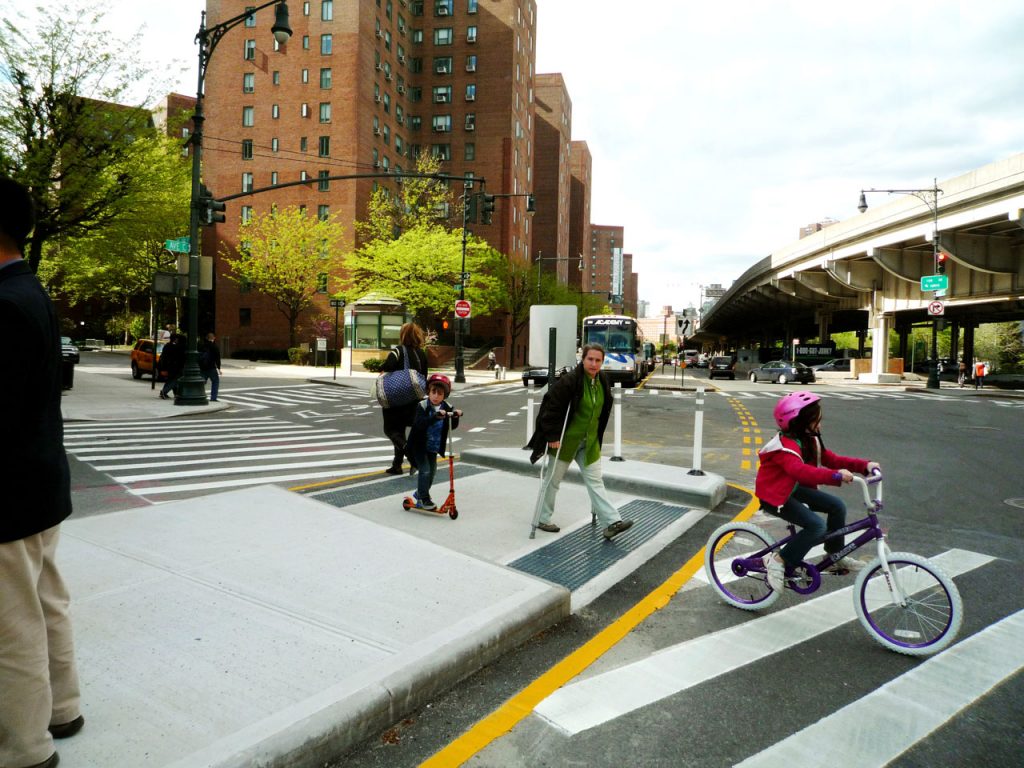
News
By Helen Hope, February 24, 2021

Today, Senator Edward J. Markey (MA) and Congressman Steve Cohen (TN-09) re-introduced the Complete Streets Act of 2019, a bill that promotes safer and more accessible street design across the United States.
The United States has a crisis: pedestrian fatalities increased by 35.4 percent between 2008 and 2017. In 2018 alone, 6,227 pedestrians were killed in motor vehicle crashes, the highest fatality rate since 1990.
The alarming increase in the number of people killed while walking is happening because our streets, which we designed for the movement of vehicles, have not changed. In fact, we are continuing to design streets that are dangerous for all people.
These numbers can change with better street design (as we argue in our landmark report on pedestrian fatalities every other year). A “Complete Street” is one designed to provide safe and accessible transportation options for multiple modes of travel, as well as for people of all ages and abilities. They can accommodate pedestrians, bicyclists, and public transit users, not just cars and freight vehicles.
To create safer streets, the Complete Streets Act does three basic things:
- Sets aside federal funds to support Complete Streets projects (five percent of annual federal highway funds)
- Requires states to create a program to provide technical assistance and award funding for communities to build Complete Streets projects
- Directs localities to adopt a Complete Streets policy that meets a minimum set of standards to access that dedicated funding
The Complete Streets Act requires that states set aside a portion of their federal highway funding to create a grant program that funds Complete Streets projects to make transit routes safer and more accessible. Through this program, eligible local and regional entities can apply for technical assistance and capital funding to build safe streets projects, such as sidewalks, bike lanes, crosswalks, and bus stops.
The federal Complete Streets Act is modeled on a landmark law in Massachusetts that has catalyzed the adoption of nearly 200 local Complete Street policies and implementation plans and funded over 100 safety projects in just three years. The cumulative effect is safer roads for everyone—no matter whether they’re walking, biking, scooting, taking transit, or driving.
The best way to understand the value of Complete Streets is to experience them—which is why the Complete Streets Act would make it easier for communities to launch “demonstration projects” that showcase the positive impact of Complete Streets. In 2018, Smart Growth America helped community members and county officials in Lexington, KY deploy inexpensive, flexible materials to redesign dangerous intersections by redirecting cars and adding crosswalks and pedestrian refuges.
Unlike a state program, a federal Complete Streets law dedicates more resources to safety, has a wider impact, and helps undo some of the damage that has been done thanks to federal transportation policy that incentivizes states to prioritize high vehicle speeds above all else . After all, federal dollars and policies helped create unsafe streets in the first place, and federal funds, policies, and guidance have a significant role to play in fixing our existing streets and in designing the streets we’ll build tomorrow.
“Federal transportation policy incentivizes states to make every street—even a community road lined with businesses and homes—a high-speed thoroughfare. As a result, the number of people struck and killed while walking is skyrocketing,” said Scott Goldstein, policy director of Transportation for America, a program of Smart Growth America. “The Complete Streets Act is a huge step towards reversing these perverse incentives by reallocating existing funding and empowering cities and towns to design streets that keep everybody safe. We are pleased to support this important legislation again this year.”
This bill is the product of more than a decade of work by the National Complete Streets Coalition and Smart Growth America. We urge Congress to pass the Complete Streets Act this year to create safer, healthier, and more equitable communities.
Related News

© 2025 Smart Growth America. All rights reserved
Site By3Lane Marketing








